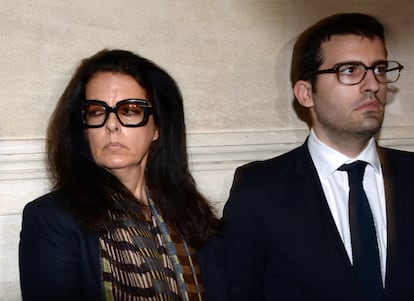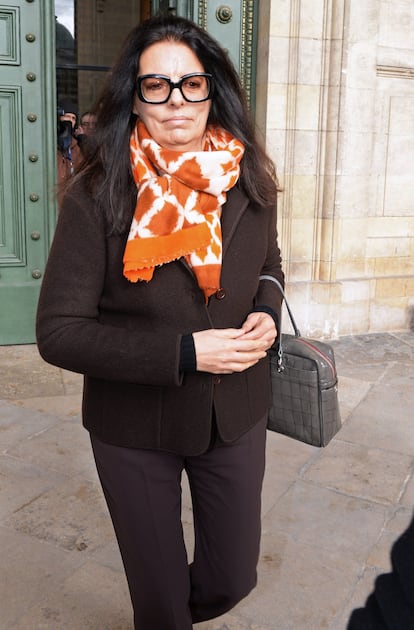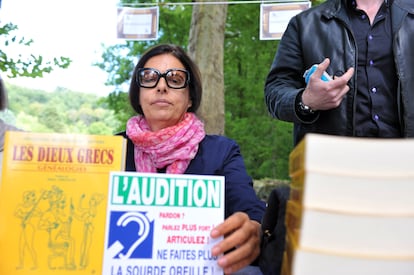This is Françoise Bettencourt, the richest woman in the world, who lives in hiding to be happy
As well as a fortune of more than $100 billion, the heir to the L’Oréal fortune enjoys the most priceless possession of the ultra-rich: anonymity

It is often said that after a certain level, money is always a problem. Liliane Bettencourt, who knew something about fortunes — as the heiress to the cosmetics giant L’Oréal, she was for years the richest woman in France, with an estimated capital of €31.2 billion (approximately $35 billion) — once confirmed that “once you reach a certain amount of money, people lose their minds.” Her only daughter, Françoise, has spent a lifetime being discreet about her wealth. “Indeed, money does drive people crazy,” she declared in a single interview she gave to Le Monde in 2012.
Born in 1953, Françoise Bettencourt Meyers has always transcended the cliché of the millionaire heiress. On December 28, 2023, she officially became the richest woman in the world, as well as the first to break through the $100 billion barrier thanks to the rise in the company’s shares, according to Bloomberg. “Again, I know that I’m privileged but, as you can see, I don’t live in a mansion. We are not big art collectors and, as you can see, I don’t wear jewelry,” she said when she received Le M Magazine, from the newspaper Le Monde, at her home.
Bettencourt Meyers lives in a modern, contemporary two-story building with large windows; a relatively modest dwelling compared to the mansion where her parents lived in the heart of the Parisian neighborhood of Saint James, in the exclusive commune of Neuilly-sur-Seine. Her mother was the daughter of Eugène Schueller, who founded L’Oréal in 1909 after discovering an innovative hair dye. Her father, André Bettencourt, was a minister during the presidency of Charles de Gaulle in the 1960s and 1970s. And as is so often the case in millionaire family sagas, Françoise’s childhood was not entirely happy.

As a child, she studied at the Marymount school with the Anglo-Saxon nuns of the Sacré-Cœur, in Neuilly, where she learned, according to Paris Match magazine, not to be impressed by anything. That is where she learned to always appear unperturbed. Little Françoise was later withdrawn from school and homeschooled, as her parents feared she would be kidnapped for ransom. This made her somewhat reclusive. Throughout her childhood she rubbed shoulders with François Mitterrand, one of her father’s closest friends, as well as with Georges Pompidou, whom he served as minister several times. Bettencourt later studied at the Academy of Fine Arts, and soon decided to protect herself from ostentation.
Her introspective, shy nature clashed with the splendid Liliane, who was a social butterfly, a beautiful woman addicted to haute couture that acted as a high society lady and enjoyed her immense wealth: she even bought an island in the Seychelles. The mother-daughter relationship was a tense one since the moment Françoise reached adolescence; according to Vanity Fair, she once declared that her daughter Françoise “was heavy and slow; always one lap behind me.” Liliane also referred to her daughter as “a cold child” in an interview with a French newspaper, as reported by The New York Times. Years later, in Le M Magazine, Françoise would speak kindly about their differences: “She was always beautiful, yes, but I never felt the slightest rivalry. The word ‘jealousy’ seems strange to me. I saw her with admiration, as she always looked elegant. Do we have different tastes and personalities? Yes, again, but is that an obstacle?”
Not keen on interviews, Francoise has leaned more towards an intellectual than a social profile, finding her calling in classical music: they say that she spends three hours a day playing one of the two grand pianos she has in her living room, a Yamaha and a Steinway. “When I start the day playing a Bach-Busoni I feel better. Music is my oxygen... Well, let’s not exaggerate. I don’t spend the day practicing scales!” she told Le M Magazine. According to Paris Match, she is also a great reader: among the books in her library is Clara Malraux’s biography by Dominique Bona. Since 2005, she has supported the Île-de-France Cochlear Implantation Institute, where Professor Bruno Frachet is developing an innovative surgery for the deaf. Again, the shadow of her mother Liliane, who had hearing problems since she was little, falls on her path.
Born beyond abundance
“I have always been very close to my parents, perhaps even more so to my mother. My father was in politics and was often absent, but she was the bridge,” Bettencourt Meyers said in her interview with Le M Magazine. When she was little, she recalls, they used to call her “the rock mussel” because she was so attached to her mother, with whom she often traveled.
Françoise claimed that “money really drives you crazy” and that, although she is aware of her privilege, she was never raised to worship money. “When I was a child, my parents always made sure that I understood the differences between play and sincerity, between right and wrong. I was educated in religious schools, where education and the transmission of the values of honesty and righteousness were fundamental. At home we didn’t talk about money. It was a word that was not easy to pronounce.”

Her fortune has not affected her personal relationships, and she maintains long-standing friendships. Among them, Paris Match mentions the French actress and soprano Arielle Dombasle, Alain Pompidou and his wife Claude, her cousins the Chalendars and the French pharmaceutical businessman Jean-Marie Lefebvre. When she was young, she was always keenly aware of the honesty of others: “If someone had wanted to marry me just because I had money, I would have seen it. I waited a long time for my husband and I know that it was not the money that attracted him; we know each other since we were in diapers!” she declared in Le M Magazine.
When she was 19, Françoise met Jean Pierre-Meyers, her future husband, who came from a wealthy family of French Jewish bankers and was the son of a L’Oréal manager. As reported by Paris Match, Françoise dated the heir of a big name in the automobile industry for several years, and her parents introduced her to several young people from high society, including an aristocrat that was the son of a banker. By then Françoise had two things clear: first, she would not accept a marriage of convenience. Second, she was already in love. Jean Pierre-Meyers, however, was not the husband her parents would have dreamed for her, especially because he was Jewish, the grandson of a rabbi murdered at Auschwitz. This reopened an old wound, as there were two sensitive episodes in the family’s past: Eugène Schueller, the revered founder of L’Oréal, had been investigated for Nazi collaboration after the war, and André Bettencourt himself had written antisemitic articles for a German-backed newspaper in 1941 and 1942 before switching sides and joining the Resistance.
But Françoise had made up her mind. Even though 10 years passed before the wedding was finally celebrated, the Bettencourts had no choice but to give in. The ceremony, which was held privately, took place in Tuscany, in Fiesole, north of Florence. Afterwards, a lavish reception was held in Paris, attended by the French top brass. From that moment on, Jean Pierre was part of the clan: it was him who became really involved in the company, at the request of her own father.
The couple had two sons: Jean-Victor (1986) and Nicolas (1988), both born at the Antoine-Béclère hospital in Clamart, a suburb five miles southwest of Paris. According to what was published in the French press, Françoise chose a French governess for them instead of a sophisticated English nurse, as was customary in her social class. Since they were children they have been protected like jewels: they have not given a single interview, and very few photos of them have been published. Françoise tried to spend a lot of time and travel with both of them, but also with each one separately, teaching them about the outside world, culture and art. Jean-Victor obtained a master’s degree from a business school and Nicolas studied communication. Both are now part of the company. The Bettencourt Meyers and their family own about 33% of the shares of L’Oréal, the world’s largest manufacturer of beauty products.
Her relationship with her husband changed Françoise’s view of others and, specifically, of the Bible. She studied the relationships between the Catholic and Jewish religions and spent 10 years writing a book about them, which ended up becoming a five-volume study of the Bible. She also published a genealogy of Greek mythology. As Tom Sancton, author of the book The Bettencourt Affair stated and Time reported, Françoise “truly lives within her own bubble, primarily immersed within her family circle.”

Caviar for the press
The family peace was disrupted in 2007 when a huge scandal, a sort of French Watergate, shook the foundations of the country’s politics and society. A month after her father’s death, Bettencourt Meyers sued François-Marie Banier, a close friend of her mother for 20 years, for abus de faiblesse (abuse of weakness). The photographer, four decades younger than her mother, who was 87 at the time, had been receiving more than €1.3 billion in gifts for years, including a Picasso, a Matisse and a Mondrian, as well as several life insurance policies that Liliane signed for him after two hospital admissions. Banier had known Dalí and Yves Saint Laurent in his youth, had rubbed shoulders with personalities like Samuel Beckett, Kate Moss, Mick Jagger and Princess Caroline of Monaco, and due to his friendship with Johnny Depp, he was Lily-Rose Depp’s godfather. He was interesting, fun and irresistible. Also, apparently, possessive and manipulative.
Thus began a trial that was caviar for the press: a soap opera involving politics, one of France’s largest inheritances and a questionable charmer of elderly women (Banier had previously had similar experiences with other wealthy older women). “I am fighting to protect my mother,” Françoise declared at the time. A butler made a recording where it was revealed that Banier had been named the sole heir to Liliane’s fortune. The scandal ended up affecting President Nicolas Sarkozy, who was accused of illegal financing. He was acquitted, but in the process his Minister of Labor, Eric Woerth, had to resign. The trial lasted 10 years and it was determined that Liliane suffered from dementia. She was placed under the control of her daughter and two grandchildren.
The richest woman in the world
The 70-year-old L’Oréal heiress became one of the richest women in her country upon the death of her mother at the age of 94 in 2017, and now she has risen to a new level. Since the end of 2023, she holds the title of the first woman to accumulate a fortune of more than $100 billion, a milestone that occurred when the shares of L’Oréal SA reached a record price, in what has been the company’s best year since 1998. Today she is the eleventh richest person on the planet. Still, she prefers not to lead an ostentatious lifestyle, enjoying the greatest luxury that a billionaire could wish for: anonymity.
Françoise usually wears a dark pantsuit, whose brand is indiscernible at first glance (an example of quiet luxury), as well as a shahtoosh around her neck (a shawl made with the wool of the Tibetan antelope, or chiru, by the weavers of Kashmir). Her makeup is very discreet and she wears thick glasses with a frame that brings to mind those of the 1970s. Her universe, according to Paris Match, revolves around her family, her friends, music, literature and cinema — such as Jacques Perrin’s latest film, Oceans, which her mother helped produce. She is rarely seen at society events and only attends large dinner parties when the event is related to a professional interest. She usually goes running at the Bois de Boulogne park in a tracksuit, without attracting much attention. Françoise likes to travel (they say she loves Italy and the United States) and instead of skiing in the elite Swiss resorts of Gstaad or Saint-Moritz, she prefers the luxurious but quiet Megève. As the French say, pour vivre heureux, vivons caches. To live happily, live hidden.
Sign up for our weekly newsletter to get more English-language news coverage from EL PAÍS USA Edition
Tu suscripción se está usando en otro dispositivo
¿Quieres añadir otro usuario a tu suscripción?
Si continúas leyendo en este dispositivo, no se podrá leer en el otro.
FlechaTu suscripción se está usando en otro dispositivo y solo puedes acceder a EL PAÍS desde un dispositivo a la vez.
Si quieres compartir tu cuenta, cambia tu suscripción a la modalidad Premium, así podrás añadir otro usuario. Cada uno accederá con su propia cuenta de email, lo que os permitirá personalizar vuestra experiencia en EL PAÍS.
¿Tienes una suscripción de empresa? Accede aquí para contratar más cuentas.
En el caso de no saber quién está usando tu cuenta, te recomendamos cambiar tu contraseña aquí.
Si decides continuar compartiendo tu cuenta, este mensaje se mostrará en tu dispositivo y en el de la otra persona que está usando tu cuenta de forma indefinida, afectando a tu experiencia de lectura. Puedes consultar aquí los términos y condiciones de la suscripción digital.









































